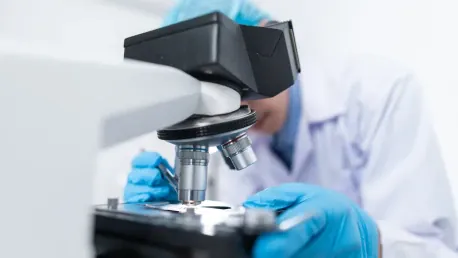South Korea’s pharmaceutical and biotech industry is witnessing a fascinating shift as Contract Development and Manufacturing Organizations (CDMOs) and biosimilar developers are experiencing robust growth, while traditional pharmaceutical companies lag. At the forefront of this transition is Samsung Biologics, a premier player in the biopharmaceutical contract manufacturing landscape. The company recently reported a significant 6.3% year-on-year increase in operating profit, reaching 338.6 billion won ($245.2 million) alongside a 14.8% surge in revenue to a record 1.18 trillion won. Key contributors to Samsung Biologics’ impressive performance include a rise in global demand for biopharmaceuticals, fully operational plants in Songdo, beneficial exchange rates, and record-breaking orders of 3.2 trillion won in July and October.
On top of their stellar results, Samsung Biologics is gearing up for future growth by ramping up operations at their fourth plant and preparing for the launch of a fifth plant in April 2025, which has already attracted strong demand. Additionally, Samsung Bioepis, the company’s biosimilar development subsidiary, saw a remarkable 38% increase in operating profit. This juxtaposition of CDMO and biosimilar businesses thriving against a challenging backdrop for traditional pharmaceutical firms raises questions about the sustainability and future direction of South Korea’s pharmaceutical market.
Traditional Pharmaceutical Companies Struggle
While CDMOs like Samsung Biologics soar, traditional pharmaceutical companies are struggling to maintain their footing. Hanmi Pharmaceutical, for instance, has experienced an 11.4% decline in operating profit to 51 billion won. This downturn was further exacerbated by a substantial 42.3% drop in earnings at its Beijing subsidiary, which was significantly affected by flooding. Similarly, Chong Kun Dang (CKD) saw its operating profit plummet by 52.5% to 25.2 billion won. A key factor in this decline was the termination of a critical co-marketing contract for K-CAB, a drug targeting gastroesophageal reflux disease.
In contrast, there are some exceptions to this trend among traditional companies. Yuhan Corporation showcased a dramatic increase of 690.6% in standalone operating profit, soaring to 54.5 billion won. This surge was primarily due to a milestone payment of $60 million from the FDA’s approval of its non-small cell lung cancer treatment, Leclaza, which was licensed to Janssen. However, it’s worth noting that without this one-off payment, Yuhan Corporation would likely have faced an operating loss, illustrating the thin line some traditional firms are walking between success and failure in this competitive landscape.
Emerging Trends and Market Dynamics
The growing profitability gap between CDMO and biosimilar businesses compared to traditional pharmaceutical companies is becoming increasingly evident. CDMO firms like Samsung Biologics are benefiting from faster profit cycles, as their business models hinge on manufacturing and development services for other pharmaceutical entities. This approach allows for quicker turnarounds and scaling opportunities without the prolonged timelines and significant financial risks associated with novel drug development.
Conversely, traditional pharmaceutical firms remain heavily invested in the lengthier and costlier process of novel drug development, facing various operational challenges and market shifts that have impacted their profitability. For instance, Daewoong Pharmaceutical and GC Biopharma managed to achieve modest growth, with operating profit increases of 20.3% and 20.8%, respectively. However, these figures pale in comparison to the rapid gains observed in companies focused on CDMO and biosimilar ventures. The strategic emphasis on faster-profit sectors seems to offer a more stable and lucrative path forward in these uncertain times.
The Future of South Korea’s Pharmaceutical Sector
South Korea’s pharmaceutical and biotech industry is undergoing a significant transformation, with Contract Development and Manufacturing Organizations (CDMOs) and biosimilar developers like Samsung Biologics experiencing impressive growth. Traditional pharmaceutical companies, however, are falling behind. Notably, Samsung Biologics, a leading biopharmaceutical contract manufacturer, has reported a 6.3% year-on-year increase in operating profit, reaching 338.6 billion won ($245.2 million), and a revenue surge of 14.8% to a record 1.18 trillion won. This success is driven by rising global demand for biopharmaceuticals, fully operational plants in Songdo, advantageous exchange rates, and record-breaking orders totaling 3.2 trillion won in July and October.
Looking ahead, Samsung Biologics is preparing for further growth by expanding operations at its fourth plant and planning the launch of a fifth plant in April 2025, which has already seen strong demand. Additionally, its biosimilar development subsidiary, Samsung Bioepis, saw a remarkable 38% increase in operating profit. The contrast between the flourishing CDMO and biosimilar sectors and the struggling traditional pharmaceutical firms raises questions about the sustainability and future direction of South Korea’s pharmaceutical market.









